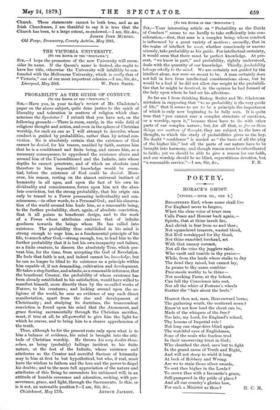PROBABILITY AS THE GUIDE OF CONDUCT.
[TO THE EDITOR OF THE " SPECT ATOR:1 So.,—Have you, in your to-day's review of Mr. Gladstone's paper on the above subject, quite done justice to the spirit of liberality and toleration in matters of religion which char- acterises the Spectator ? I submit that you have not, on the following grounds :—There is room, surely, in the wide field of religious thought and action, and even in the sphere of Christian worship, for such an one as I will attempt to describe, whose -conduct is guided by probabilities, rather than by actual con- viction. He is absolutely certain that the existence of God cannot be denied, for his reason, unaided by faith, assures him that he is a conditioned and finite being, and causes him, as a necessary consequence, to apprehend the existence above and around him of the Unconditioned and the Infinite, into whose -depths he cannot penetrate, and of which an absolute (and therefore to him impossible) knowledge would be essen- tial, before the existence of God could be denied. More- over, his reason, resting on the almost universal instinct of humanity in all ages, and upon the fact of his own in- -dividuality and consciousness, forces upon him not the abso- lute conviction, but the strong probability, that his origin can -only be traced to a Power possessing individuality and con- sciousness,—in other words, to a Personal God; and his observa- tion of the world around him leads him, as a reasonable being, to the further probability, short, again, of absolute conviction, that it all points to beneficent design, and to the work of a Power whose attributes embrace that of infinite goodness towards the beings whom He has called into • existence. The probability thus established in his mind is strong enough to urge him, as a fundamental principle of his life, to search after God,—strong enough, too, to lead him to the farther probability that it is but his own incapacity and failure, as a finite creature, to discern the absolutely True, which pre- 'vent him, for the time, from accepting the God of Revelation. He feels that faith is not, and indeed cannot be, knowledge, but he can no longer be blind to its existence as a principle within "him capable of, if not demanding, cultivation and development. He takes a step further, and admits, as a reasonable inference, that the beneficent Creator, the probability of whose existence has been already established to his satisfaction, would have willed to manifest himself, more directly than by the so-called works of Nature, to his creatures; and looking around upon the re- ligions of the world, he sees no evidence of any such direct manifestation, apart from the rise and development of 'Christianity ; and studying its doctrines, the transcendent -conviction is forced upon his mind that the Atonement, and grace flowing sacramentally through the Christian sacrifice, must, if true at all, be all-powerful to give him the light for which he craves, and to bring him to a clearer apprehension of the truth.
Thus, although he for the present rests only upon what is to him a balance of evidence, his mind is brought into the atti- tude of Christian worship. He throws his very doubts them- -selves, as being (probably) failings incident to his finite nature, at the feet of the Infinite, whose existence and Attributes as the Creator and merciful Saviour of humanity may to him at first be but hypothetical, but who, if real, must have the wisdom to fathom and the love and the power to dispel his doubts ; and to the more full appreciation of the nature and attributes of this Being he surrenders his unbiassed will, in an attitude of humble reverence and adoration, seeking, with per- -severance, grace, and light, through the Sacraments. Is this, or is it not, an untenable position P—I am, Sir, &c.,


































 Previous page
Previous page